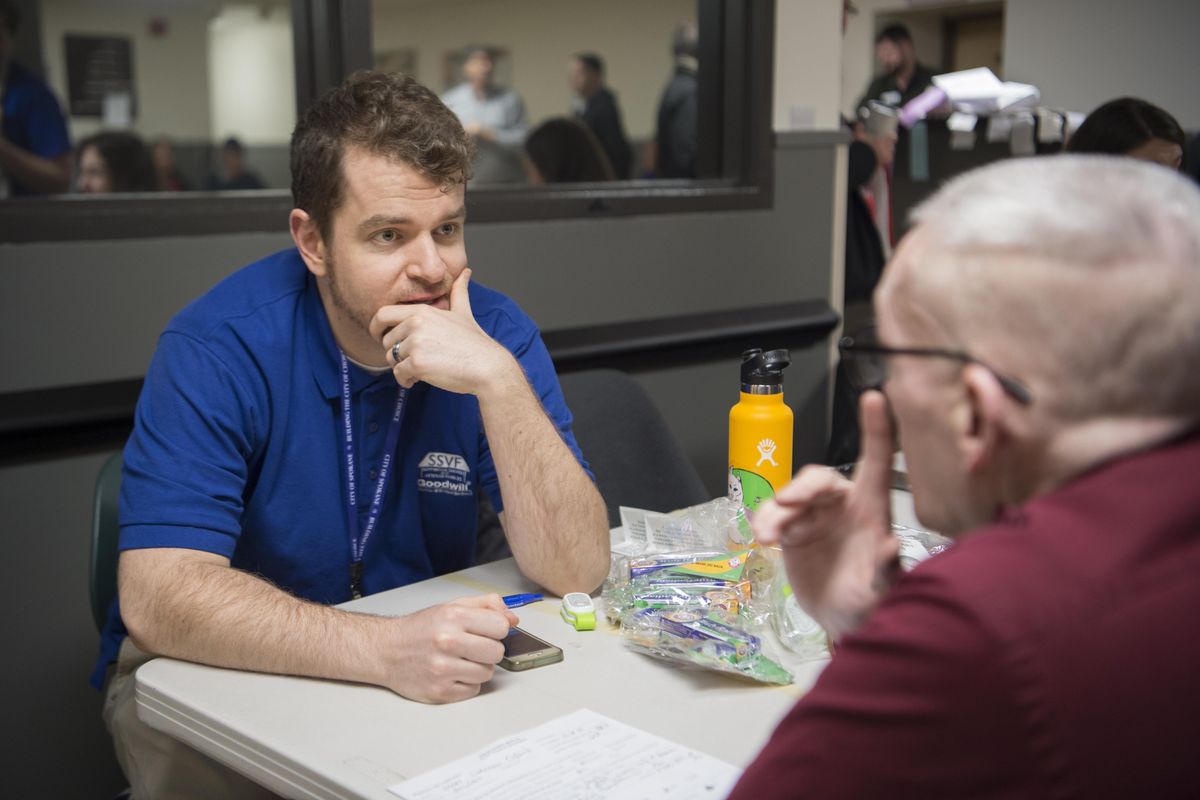With new tech in place, city hopes to improve homeless count

Dave Lewis watched in real time as surveys of homeless people in Spokane popped up on a digital map Thursday evening.
“It’s almost like election returns,” he said.
Lewis runs the city of Spokane’s homeless information management system, and is one of two city staff who run an annual census of people without a permanent home.
The federal government requires cities to count the number of homeless residents every year in late January in order to receive federal grant funding.
This year’s count is the first to use a smartphone app to collect data, which lets the city see results in real time. As of 4:40 p.m. Thursday, 208 surveys had come in, as volunteers fanned out around the county at shelters, food banks and other service providers.
At the Union Gospel Mission men’s shelter, the day room was full, as roughly a dozen volunteers from the city and various social service agencies surveyed residents, phone in hand.
Josiah Torba, an outreach worker with Goodwill’s Supportive Services for Veteran Families program, walked through the list of questions with a 63-year-old man who said he was newly homeless that night.
The survey doesn’t ask homeless people to give their names. When asked, the man said his name was Sharky.
He told Torba he’d been homeless before, but lately had been staying near Kalispell. He is HIV-positive but said his condition was well-managed and didn’t cause him health problems. Still, he’d been to the emergency room four times in the past year, mostly for hernias.
When Torba asked if he’d ever had an alcohol or drug addiction, Sharky said, “Well, yeah, years ago I was a fisherman … ”
He said he’s been living in the Spokane area for the past 15 years, and pointed to his healthy blood pressure, which he had recorded on a scrap of paper he carried around in an envelope.
At another table, Matt Davis, a homeless program specialist with the city, surveyed David Fisher, a 41-year-old man who said he’s been homeless for two years while traveling all over the country.
He was quieter with his responses, saying he had no disabilities or medical conditions. He drinks sometimes, he told Davis, but not since coming to UGM.
“When it’s uncomfortable out there, people tend to drink,” he said.
In addition to the app, Spokane made an effort to reach a larger array of homeless people this year by partnering with Homeless Connect, an annual resource fair for homeless people that took place Thursday morning.
Tija Danzig, the city’s homeless services program manager, said being at the event allowed them to reach people living in their cars, who are often difficult to survey.
They’ve also sent teams outside city limits in an effort to get a better picture of the region. Danzig said it was exciting seeing surveys from other cities show up on the map.
“We started seeing things pop up in Spokane Valley,” Danzig said.
Mayor David Condon and City Council President Ben Stuckart were both at the shelter Thursday night watching the count. Neither had surveyed anyone personally, though Stuckart had downloaded the app and had Davis walk him through it.
Condon said he was excited to have real-time numbers that can been polished into a final report much more quickly than the paper surveys the city has used in the past.
He hoped the results would give the city an idea of how well available services are matching with the help people need.
“If we have a lot of need in a certain area and we don’t have services, we’ll have to fill it,” he said.
Stuckart said he’s heard anecdotally from service providers that the city’s homeless population grew significantly last summer and said he was curious to see if the survey bears that out.
“It’s really valuable data that can inform decisions later,” he said.